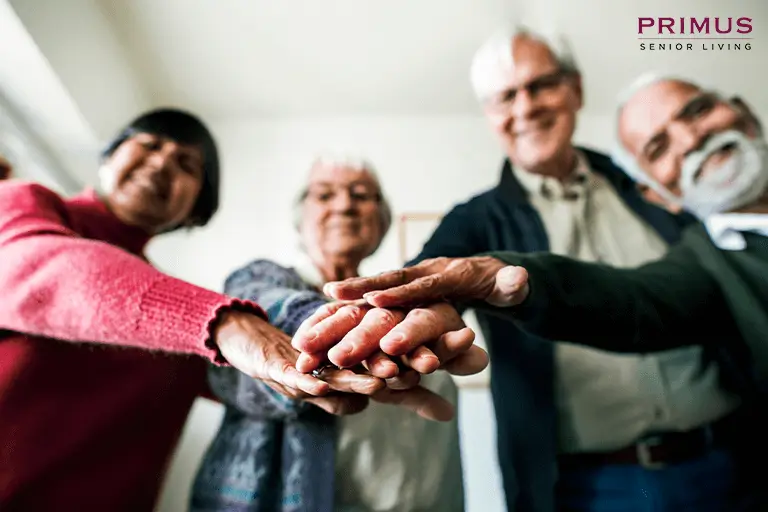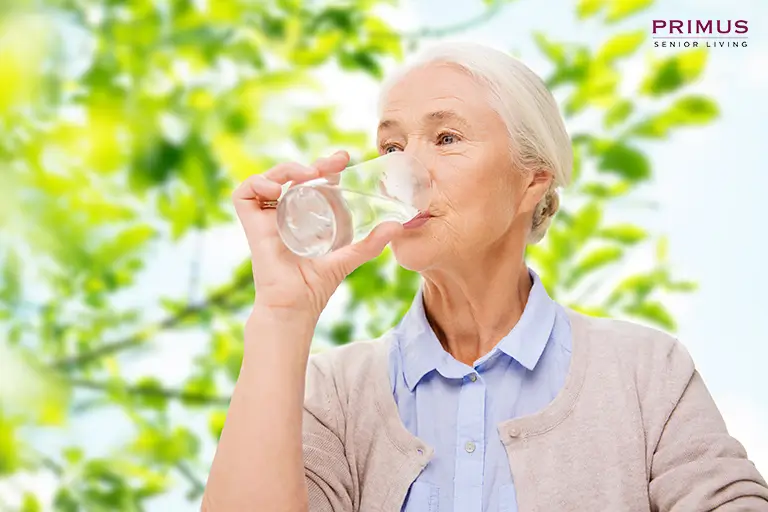Our bodies need water to perform basic functions like digestion, excretion, circulation. Our body would slowly start failing us if we don’t provide it with the fluid requirement it needs. And this is what we call dehydration. Dehydration is when the body doesn’t have as much fluid within the vells and blood vessels as it should. Generally, our body gains fluid through what we eat and drink. It loses fluid through urination, sweating and other bodily functions. But when we lose more fluid than we take in, our body can become dehydrated. When a person starts to get dehydrated, the body is designed to signal thirst. The kidneys concentrate the urine so that less water is lost that way.
This is where problems start for older people. Unfortunately, the body mechanisms meant to protect us from dehydration deteriorate as we age. Older adults have decreased thirst signals. This makes senior citizens more prone to dehydration than younger adults or children.
How Much Water Should Seniors Drink to Avoid Dehydration?
Older adults may also have certain issues that put them at risk of dehydration.
- Chronic problems with urine continence which might make them hesitant to take a lot of fluids.
- Memory problems can cause them to forget to drink water at regular intervals.
- Mobility problems that might make it harder for them to go get their own drink.
- Swallowing difficulties.
Problems like vomiting, diarrhea, fever, and infection ( old people are prone to these as well ) are all problems that can cause people to lose a lot of fluid and become dehydrated. And of course, hot weather always increases the risk of dehydration. Older adults might also be taking medications that increase the risk of dehydration.
How much is enough?
There is a common misconception that hydration is just drinking water. This is not true.
In fact, hydration has more to do with your diet than it has to do with how many glasses of water you drink every day. A person’s diet can affect hydration levels greatly. Fruits, vegetables and soups are mostly water-based. Day in and day out, a lot of people get their water from foods.
Measuring the senior’s weight every day can help spot dehydration before it gets severe. Mild dehydration is defined as losing 2 percent of your body weight and severe dehydration occurs when they lose 4 per cent or greater weight loss in a day. Even mild dehydration can affect a person’s health, especially if he/she has cardiac or renal problems.
So instead of just offering numerous glasses of water every day, here are some things you can follow to make sure your loved one stays properly hydrated.
- Offer smaller quantities of fluid more often; older adults may be reluctant to drink larger quantities less often.
- Offer fruits that are rich in water content, like watermelons.
- Be sure to provide a beverage that is appealing.
- See if the older person seems to prefer drinking through a straw.
- Identify any continence concerns that may be making the person reluctant to drink. Keeping a log of urination and incontinence episodes can help.
- Consider a timed toileting approach, which means helping the older person get to the bathroom on a regular schedule. This can be very helpful for people with memory problems or mobility difficulties.
- Track your efforts in a journal. You’ll want to track how much the person is drinking; be sure to note when you try something new to improve fluid intake.
- Offer extra fluids when it’s hot, or when the person is ill.
If your loved one is in a care facility, make sure that the staff assist residents with drinking, offer a variety of beverages and provide drinks not only at mealtimes but in between meals. Make sure that they monitor residents’ weight and assess them if their physical condition or mental state changes. These methods might prove to be a lot of work at home. But seniors need that attention and care from us in order to live a happy and smooth life. Organized Senior Housing facilities like Primus make this easier. They have professionals who are trained to take care of our loved ones in the comfort of their homes and push-button facilities to provide 24×7 emergency assistance.
You may also like

Why Quality Senior Homes Are An Absolute Must In Any City
Have you imagined your retired life to be relaxing with your favourite novel in one hand and a cup of coffee in another; while everything else is taken care of? However, not everyone gets the retired life of their dreams. That's because of the lack of quality senior homes across the country. If you think a good senior home wonot make much of a difference in a senior's life, you are in for a surprise. Here are a few points why quality senior homes are an absolute must in any city.
READ MORE.webp)
Is There Any Difference Between Memory- Care Centre And Assisted Living Centres?
There will come a point in everyone's life where one will not be able to live independently. It poses a difficult situation for the caregiver, who has to decide what kind of long-term care options to consider for their loved ones. Not all are equal, and it is important to understand the needs of your loved ones before deciding on which option to choose. In terms of residential care facilities, the two that have picked up momentum are assisted living and memory care centre.
READ MORE

Leave a Comment